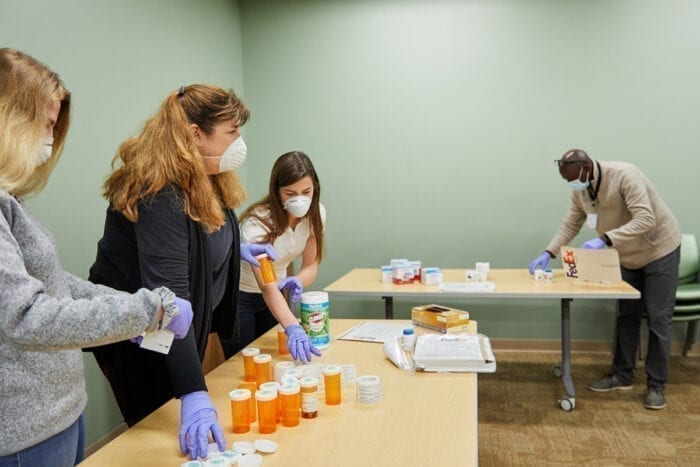
Staff of the Healthy Mind Lab at Washington University School of Medicine in St. Louis pack medication and medical equipment for participants in a COVID-19 clinical trial. The study indicated that the drug fluvoxamine may help prevent deterioration in COVID-19 patients, making hospitalization less likely.
Fluvoxamine may prevent serious illness in COVID-19 patients
In a preliminary study of COVID-19 patients with mild-to-moderate disease who were attempting to recover in their homes, researchers at Washington University School of Medicine in St. Louis have found that the drug fluvoxamine seems to prevent some of the most serious complications of the illness and make hospitalization and the need for supplemental oxygen less likely.
The study, a collaboration between the university’s Department of Psychiatry and Division of Infectious Diseases, involved 152 patients infected with SARS-CoV-2, the virus that causes COVID-19. Researchers compared the outcomes of those treated with fluvoxamine to the outcomes of those given an inactive placebo. After 15 days, none of the 80 patients who had received the drug experienced serious clinical deterioration. Meanwhile, six of the 72 patients given placebo (8.3%) became seriously ill, with four requiring hospitalization.
The study is published online Nov. 12 in the Journal of the American Medical Association.
“The patients who took fluvoxamine did not develop serious breathing difficulties or require hospitalization for problems with lung function,” said the paper’s first author, Eric J. Lenze, MD, the Wallace and Lucille Renard Professor of Psychiatry. “Most investigational treatments for COVID-19 have been aimed at the very sickest patients, but it’s also important to find therapies that prevent patients from getting sick enough to require supplemental oxygen or to have to go to the hospital. Our study suggests fluvoxamine may help fill that niche.”
Fluvoxamine is used commonly to treat obsessive-compulsive disorder (OCD), social anxiety disorder and depression. It is in a class of drugs known as selective serotonin-reuptake inhibitors (SSRIs), but unlike other SSRIs, fluvoxamine interacts strongly with a protein called the sigma-1 receptor. That receptor also helps regulate the body’s inflammatory response.
“There are several ways this drug might work to help COVID-19 patients, but we think it most likely may be interacting with the sigma-1 receptor to reduce the production of inflammatory molecules,” said senior author Angela M Reiersen, MD, an associate professor of psychiatry. “Past research has demonstrated that fluvoxamine can reduce inflammation in animal models of sepsis, and it may be doing something similar in our patients.”
Reiersen said the drug’s effects on inflammation could prevent the immune system from mounting an overwhelming response, which is thought to occur in some COVID-19 patients who seem to improve after a few days of illness and then worsen. Many of those patients end up hospitalized, and some die.
In an innovative twist to research during the pandemic, the study was conducted remotely. When a symptomatic patient tested positive and enrolled in the study, research staff delivered the medication or inactive placebo to them, along with thermometers, automatic blood pressure monitors and fingertip oxygen sensors.
“Our goal is to help patients who are initially well enough to be at home and to prevent them from getting sick enough to be hospitalized,” said Caline Mattar, MD, an assistant professor of medicine in the Division of Infectious Diseases. “What we’ve seen so far suggests that fluvoxamine may be an important tool in achieving that goal.”
For two weeks, subjects took either the antidepressant drug or placebo sugar pills while having daily interactions with members of the research team — via phone or computer. That allowed patients to report on their symptoms, oxygen levels and other vital signs. If patients suffered shortness of breath or were hospitalized for pneumonia, or their oxygen saturation levels fell below 92%, their conditions were considered to have deteriorated.
“The good news is that not a single person taking the active medication experienced deterioration,” Reiersen said. “We believe this drug may be the reason, but we need to study more patients to make sure.”
The researchers will begin a larger study in the next few weeks. Lenze, the director of the Healthy Mind Lab at the School of Medicine, is an expert in using mobile and internet technology to conduct clinical trials. He said that although this initial study involved patients in the St. Louis region, the next phase of the research will involve patients from throughout the country.
“We bring the study to the patients, giving them tools to monitor their health at home,” Lenze said. “Our hope is that we can keep these patients healthy enough to avoid hospitalization.”
The Latest Updates from Bing News & Google News
Go deeper with Bing News on:
Fluvoxamine
- Drug Interactions With Smoking
The primary pharmacokinetic interactions with smoking occur with drugs that are CYP1A2 substrates, such as caffeine, clozapine, fluvoxamine, olanzapine, tacrine, and theophylline. Inhaled insulin ...
- Understanding Benzodiazepines and How They Work
Benzodiazepines (also known as benzos) are a class of medications used to treat anxiety disorders, seizures, insomnia, and other health conditions. While effective, they can come with some side ...
- Evaluating ANI Pharmaceuticals: Insights From 5 Financial Analysts
Analysts' evaluations of 12-month price targets offer additional insights, showcasing an average target of $77.8, with a high estimate of $83.00 and a low estimate of $72.00. Observing a 9.19% ...
- How Does Fluvoxamine Work?
Fluvoxamine is a prescription medicine used in the treatment of depression and obsessive-compulsive disorder. This medicine helps by increasing the levels of serotonin, a chemical messenger in the ...
- Page settings
Fluvoxamine is used to treat obsessive-compulsive disorder (OCD). Rarely, males may have a painful or prolonged erection lasting 4 or more hours. If this occurs, stop using this drug and get ...
Go deeper with Google Headlines on:
Fluvoxamine
[google_news title=”” keyword=”fluvoxamine” num_posts=”5″ blurb_length=”0″ show_thumb=”left”]
Go deeper with Bing News on:
Preventing serious Covid-19 illness
- Monument Health works to improve lowest federal quality score
Monument Health’s flagship hospital received the lowest federal quality rating possible over the past two years, according to the Centers for Medicare and Medicaid Services, which helps ...
- 'Just in case' antibiotics widely overused during COVID-19, says UN health agency
Antibiotics saw 'extensive overuse' globally among hospitalised COVID-19 patients during the pandemic without improving clinical outcomes, while also potentially increasing the already serious and ...
- Ruling: Iowa state auditor must provide more evidence to justify withholding emails
The state auditor's office must do more to justify its decision to withhold from public release emails between his office and two journalists, the Iowa Supreme Court ruled.
- Another View: Decline in American life expectancy harms more than our health
American life expectancy started dropping even before the pandemic. It’s a critical barometer of our nation’s health and a sign that all is not well in the U.S. Much of the increase in ...
- Mental health crisis centers and EmPATH units: offering care that busy ERs can’t
As national awareness of mental illness rises and innovative care models emerge, many advocates now see a rare opportunity to remake mental health crisis care for the better.
Go deeper with Google Headlines on:
Preventing serious Covid-19 illness
[google_news title=”” keyword=”preventing serious Covid-19 illness” num_posts=”5″ blurb_length=”0″ show_thumb=”left”]










